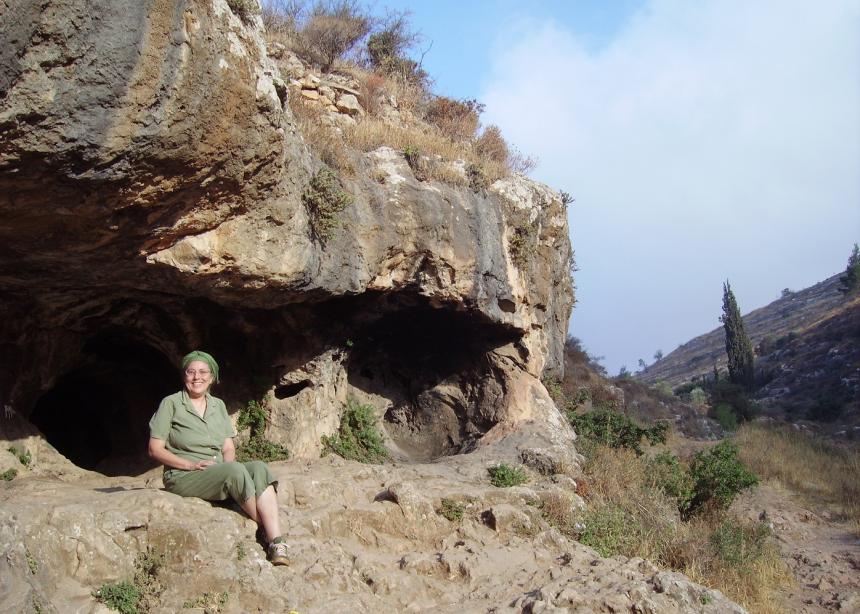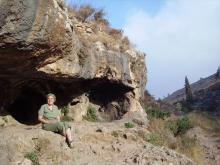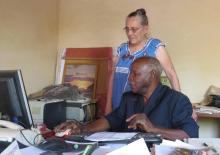The Sicite people, a small ethnic group in southwestern Burkina Faso, stepped onto the world’s linguistic stage when their language was awarded a coveted place in the Max-Planck-Institute for Evolutionary Anthropology in September 2014.
Anne Garber Kompaoré has served in Burkina Faso for more than three decades in linguistics and Bible translation. During this time, she wrote her doctoral thesis, Tonal Analysis of Senufo: Sucite Dialect, as part of her mission to make the Bible available to her neighbors in the village of Kotoura.
As part of its promotion of an interdisciplinary perspective on human history, the Max Planck Institute invited Kompaoré to contribute her doctoral thesis to Language Description Heritage, a digital library that makes the world’s languages accessible to researchers.
“I am so thankful that my hard work is bearing fruit in this way,” Kompaoré said.
Quick to acknowledge that her thesis was a team effort, Kompaoré expressed gratitude to her mission colleague, Gail Wiebe Toevs, and her Burkinabe language consultants, Nama Ouattara, Mamadou de Katien Traoré, Mamadou de Katile Traoré, Issiaka de Katile Traoré, and Gnodjoutien Traoré. [The consultants are not closely related. Traoré is a common family name in this region.]
Kompaoré also thanked her father, Leonard Garber, who developed special computer characters so Sucite could be typed and transmitted electronically.
From 1975-1976, while Kompaoré served as a teacher in Zaïre (now, Democratic Republic of Congo), she had her first taste of Bible translation work.
“In 1977, I sensed more clearly that God was calling me to work in linguistics and Bible translation among the Sicite people,” Kompaoré said. “Thus began a rich career analyzing the Sicite language and developing its orthography, as well as helping to plant a church among the Sicite people.”
Church planted within a year among “resistant” people
When Kompaoré and Wiebe Toevs moved to Kotoura in 1982, there was no Christian presence in the village, and the people were described as being “resistant to the gospel.” The two women had carefully laid plans about how to present the good news of Jesus gradually in a culturally appropriate way. They were prepared to invest years in this ministry. They prayed for God’s Spirit to precede them in their endeavor.
When Kompaoré and Wiebe Toevs asked the acting chief of Kotoura for a language teacher, he assigned his son, Tiéba Traoré, to work with them. One day, Traoré became intrigued with a children’s book about the prodigal son and his loving father, based on the biblical story found in Luke 15.
“Wow, what a wonderful story! Tell me more,” Traoré begged Kompaoré and Wiebe Toevs. “You tell me and I’ll tell [my people].”
“It was as if he was prophesying,” Kompaoré said. “Within 11 months of our arrival, we had young Christians to mentor. We were prepared to be culturally sensitive, but we weren’t ready for a church!”
Fascination with words leads to life committed to God’s Word
Intrigued by culture and languages since her youth, Kompaoré dreamed of being a United Nations interpreter. Moving in this direction, she learned French in the Canadian school system, and dabbled in Gipende (a language of Democratic Republic of Congo), German, Moose Cree (a language of northern Ontario), Russian and Spanish.
Since then, Kompaoré has studied language and theology in many countries. She received her doctorate in linguistics at the University of Illinois at Urbana-Champaign in 1987.
Spouses engage in complementary ministries
In 1993, Kompaoré married Daniel, a widower with five children. She moved to Ouagadougou, Burkina Faso’s capital city, and began supervising the translation of the New Testament into Sicite, under the administration of the National Association for the Translation of the Bible and Literacy. In the years that followed, she served as a linguistics coordinator and consultant of many different languages.
While Kompaoré still maintains contact with the Sicite people and her friends in Kotoura, her current ministry focus has expanded beyond the borders of Burkina Faso as a free-lance consultant. Through WordShare Services and Resources, she trains translators and evaluates their work. Some of her resources are being used in places where she has never been, such as India and Guatemala.
Daniel Kompaoré serves in Christian education and pastoral leadership. He served as national president of an African-Initiated Church, Apostolic Mission Church, from 2008-2013. He has founded Christian schools and a not-for-profit organization to contribute to the holistic development of the denomination. He continues to teach in denominational Bible schools, oversees the schools he founded, and pastors a young congregation in Ouagadougou.
Ann Garber Kompaoré and her husband Daniel Kompaoré live in Burkina Faso. She serves with Africa Inter-Mennonite Mission and Mennonite Mission Network (Mennonite Church U.S.A.), and for many years she was also supported by Mennonite Church Canada. Ann is a member of Listowel Mennonite Church, Ont.
—Posted Jan. 9, 2015





Add new comment
Canadian Mennonite invites comments and encourages constructive discussion about our content. Actual full names (first and last) are required. Comments are moderated and may be edited. They will not appear online until approved and will be posted during business hours. Some comments may be reproduced in print.